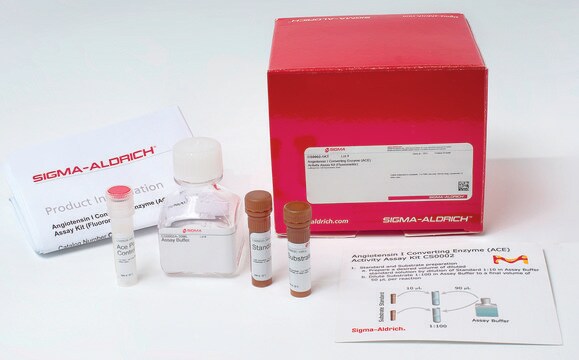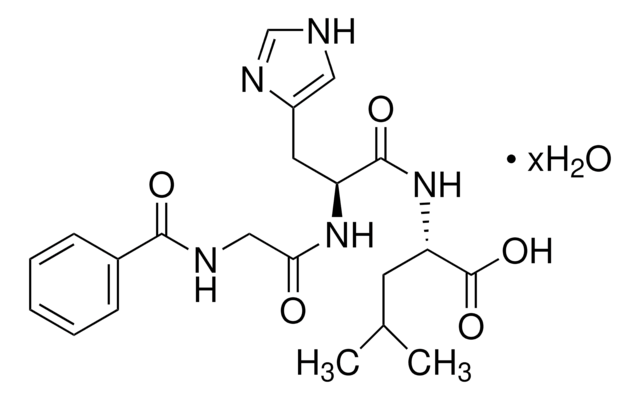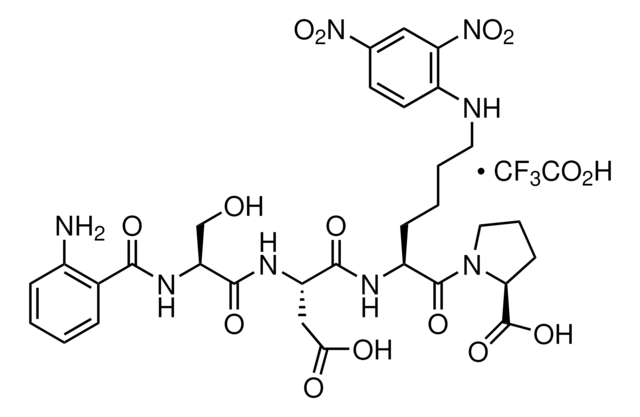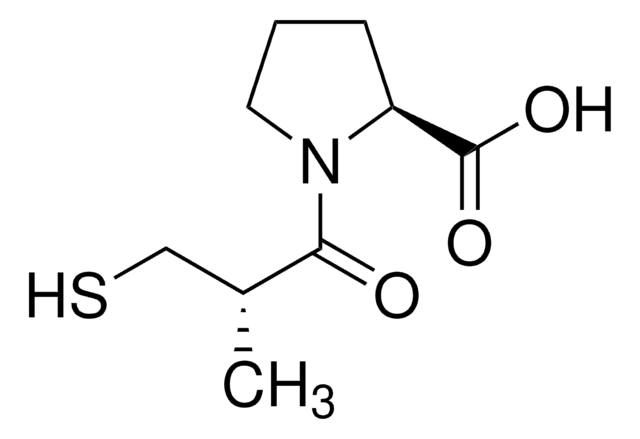A4980
Abz-FRK(Dnp)P-OH trifluoroacetate salt
≥95% (HPLC), film
Synonym(s):
o-Aminobenzoic acid-FRK(Dnp)P-OH, o-aminobenzoic acid-Phe-Arg-Lys(DNP)-Pro-OH trifluoroacetate salt, Abz-Phe-Arg-Lys(DNP)-Pro-OH
Sign Into View Organizational & Contract Pricing
All Photos(1)
About This Item
Empirical Formula (Hill Notation):
C39H49N11O10 · xC2HF3O2
Molecular Weight:
831.87 (free base basis)
UNSPSC Code:
12352200
NACRES:
NA.77
Recommended Products
Assay
≥95% (HPLC)
form
film
color
yellow
storage temp.
2-8°C
Amino Acid Sequence
Abz-Phe-Arg-Lys-DNP-Pro
Application
Abz-FRK(Dnp)P-OH trifluoroacetate (TFA) is a substrate for the Angiotensin Converting Enzyme (ACE). Abz-FRK(Dnp)P-OH TFA has been used to study both the reduction of mortality of patients with sepsis and paracetamol-induced hypothermia.
Biochem/physiol Actions
Substrate for ACE (Angiotensin Converting Enzyme). Internally quenched fluorogenic substrate for Real Time Fluorescent Assay.
Features and Benefits
This compound is featured on the Angiotensin Receptors page of the Handbook of Receptor Classification and Signal Transduction. To browse other handbook pages, click here.
Storage Class Code
11 - Combustible Solids
WGK
WGK 3
Flash Point(F)
Not applicable
Flash Point(C)
Not applicable
Certificates of Analysis (COA)
Search for Certificates of Analysis (COA) by entering the products Lot/Batch Number. Lot and Batch Numbers can be found on a product’s label following the words ‘Lot’ or ‘Batch’.
Already Own This Product?
Find documentation for the products that you have recently purchased in the Document Library.
Jérémie Neasta et al.
British journal of pharmacology, 173(8), 1314-1328 (2016-03-31)
Using an in-house bioinformatics programme, we identified and synthesized a novel nonapeptide, H-Pro-Pro-Thr-Thr-Thr-Lys-Phe-Ala-Ala-OH. Here, we have studied its biological activity, in vitro and in vivo, and have identified its target in the brain. The affinity of the peptide was characterized
Maria Fernanda de M Costa et al.
Journal of veterinary science, 12(1), 21-25 (2011-03-04)
Angiotensin-I converting enzyme (ACE) is a key regulator of blood pressure, electrolytes and fluid homeostasis through conversion of angiotensin I into angiotensin II. Recently, a genetic polymorphism of the ACE gene, which accounts for 47% of the variation of ACE
Arnau Hervera et al.
Molecular pain, 7, 25-25 (2011-04-14)
The local administration of μ-opioid receptor (MOR) agonists attenuates neuropathic pain but the precise mechanism implicated in this effect is not completely elucidated. We investigated if nitric oxide synthesized by neuronal (NOS1) or inducible (NOS2) nitric oxide synthases could modulate
Samir S Ayoub et al.
Drug metabolism and disposition: the biological fate of chemicals, 39(9), 1689-1695 (2011-06-02)
In recent years, there has been increasing interest in hypothermia induced by paracetamol for therapeutic purposes, which, in some instances, has been reported as a side effect. Understanding the mechanism by which paracetamol induces hypothermia is therefore an important question.
Wen Yang et al.
The Journal of pharmacology and experimental therapeutics, 339(3), 832-841 (2011-08-30)
Treatment with statins, inhibitors of HMG-CoA reductase, extends the survival of septic mice. However, the molecular mechanisms underlying the cholesterol-lowering, independent beneficial effects of statins in sepsis are poorly understood. The inhibition of protein isoprenylation, namely farnesylation and geranylgeranylation, has
Our team of scientists has experience in all areas of research including Life Science, Material Science, Chemical Synthesis, Chromatography, Analytical and many others.
Contact Technical Service







![N-[3-(2-Furyl)acryloyl]-Phe-Gly-Gly](/deepweb/assets/sigmaaldrich/product/structures/225/349/530bc714-b1a8-4fdb-8082-a39329ee730a/640/530bc714-b1a8-4fdb-8082-a39329ee730a.png)
